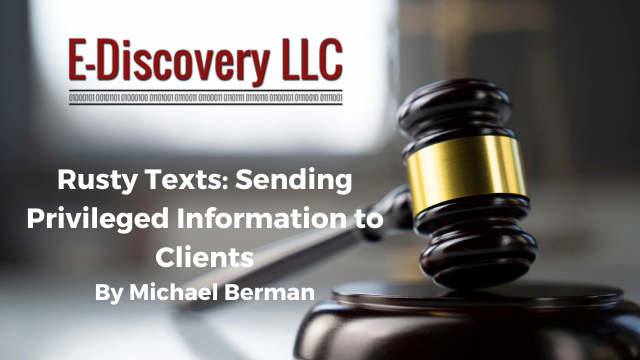
[EDRM Editor’s Note: The opinions and positions are those of Michael Berman.]
In ‘Rust’ Armorer’s Phone Snafu Shows Risks Of Texting Clients – Law360 (Feb. 13, 2024), Phillip Bantz wrote: “A legal dust-up over compromised text messages between a movie prop weapons expert and her lawyer in the ‘Rust’ film shooting case raises questions about whether attorneys should text with clients and serves as a cautionary tale for prosecutors and the defense on the importance of protecting privileged communications, experts say.”
The attorney for Ms. Hannah Gutierrez-Reed, the armorer in the well-known “Rust” shooting case, texted with his client, the armorer. The texts reportedly included defense strategies. After searches of the cell phone, they came into the prosecutors’ custody. They were then disclosed to another person under a public records request. The armorer moved for disqualification of the prosecutors. The motion was denied.
Mr. Bantz reports that the defendant “wants the court to dismiss the case against her over what [defense attorney] Bowles has described in court filings as ‘novel’ and ’uniquely troubling’ violations of attorney-client privilege.”
However, the article states that prosecutors “stressed in a recent court filing that Bowles signed a consent form allowing for data to be pulled from Gutierrez-Reed’s phone and failed to limit the scope of the search — unlike Baldwin’s attorneys, who ‘took care to detail in writing all limitations on the consent to search’ the actor’s cellphone.” They alleged that the “disclosures were the direct result of cavalier legal representation by the defendant’s counsel….”
In response, defense counsel “asserts that prosecutors should have filtered out any attorney-client communications while extracting data from Gutierrez-Reed’s cellphone and before sending 18,000 pages of extraction records to key prosecution witness Seth Kenney, whose company supplied prop weapons and ammunition for ‘Rust.’”
Mr. Bantz reports that the prosecutor “has told the court that she didn’t initially realize the data extraction included privileged information, never read the armorer’s texts and deleted the data right after she realized what happened.” He explains that the prosecutor said that defense counsel was also promptly notified about the disclosure.
Defense counsel retorted that the leak is “unfixable,” according to Mr. Bantz. He reports that a first-pass search of the defendant’s phone pulled about 1,000 pages and excluded attorney-client communications. Prosecutorial review found “large swaths of conversations” were missing. A second “filtering” brought back 18,000 documents, including privileged communications.
Mr. Bantz adds:
While text messages have become an increasingly popular form of client communication among lawyers, it’s best to avoid texting privileged or otherwise sensitive information because it’s difficult to ensure that texts remain private, according to legal ethics expert Peter Joy, a professor at the Washington University School of Law in St. Louis.
“This is a cautionary tale about what not to do when communicating with a client,” Joy told Law360.
Phillip Bantz, ‘Rust’ Armorer’s Phone Snafu Shows Risks Of Texting Clients – Law360 (Feb. 13, 2024).
In a subsequent article, Debra C. Weiss wrote that: “In a hearing Wednesday, Judge Mary Marlowe Sommer of the First Judicial District in New Mexico refused to toss the case against Rust armorer Hannah Gutierrez-Reed. Sommer said Gutierrez-Reed had signed a consent to search her cellphone that had no limitations, and she was not prejudiced by the disclosure.” Prosecutors blame disclosure of attorney-client texts on ‘cavalier legal representation’ by ‘Rust’ armorer’s lawyer (abajournal.com)(Updated Feb. 15, 2024).
Ms. Weiss reports that the Judge said: “To reiterate, if you consent to a search, anything of evidentiary value seized in the course of the search can and may be introduced as evidence….”1
Ms. Weiss reported:
Criminal defense lawyer John W. Day of Santa Fe, New Mexico, told Law360 that it’s best to use “old-school stuff” when communicating with clients, meaning talking in person or on the phone.
Debra C. Weiss, Prosecutors blame disclosure of attorney-client texts on ‘cavalier legal representation’ by ‘Rust’ armorer’s lawyer (abajournal.com)(Updated Feb. 15, 2024).
In my blog, Maryland Amends Ethics Rule 4.4(c), I pointed out that Maryland’s non-uniform version of Rule 4.4(c) provides:
- In representing a client, a lawyer shall not use means that have no substantial purpose other than to embarrass, delay, or burden a third person, or use methods of obtaining evidence that violate the legal rights of such a person.
- A lawyer who receives a document or electronically stored information relating to the representation of the lawyer’s client and knows or reasonably should know that the document or electronically stored information was inadvertently sent shall promptly notify the sender.
- In communicating with third persons, an attorney representing a client in a matter shall not seek information relating to the matter that the attorney knows or reasonably should know is protected from disclosure by statute or by an established evidentiary privilege, unless the protection has been waived. An attorney who receives information that is protected from disclosure shall (1) terminate the communication immediately and (2) give notice of the disclosure to the person entitled to enforce the protection against disclosure. If the person entitled to enforce the protection against disclosure is represented by an attorney, the notice required by this Rule shall be given to the person’s attorney.
Notes
[1] Ms. Weiss cited a Law360 report.


